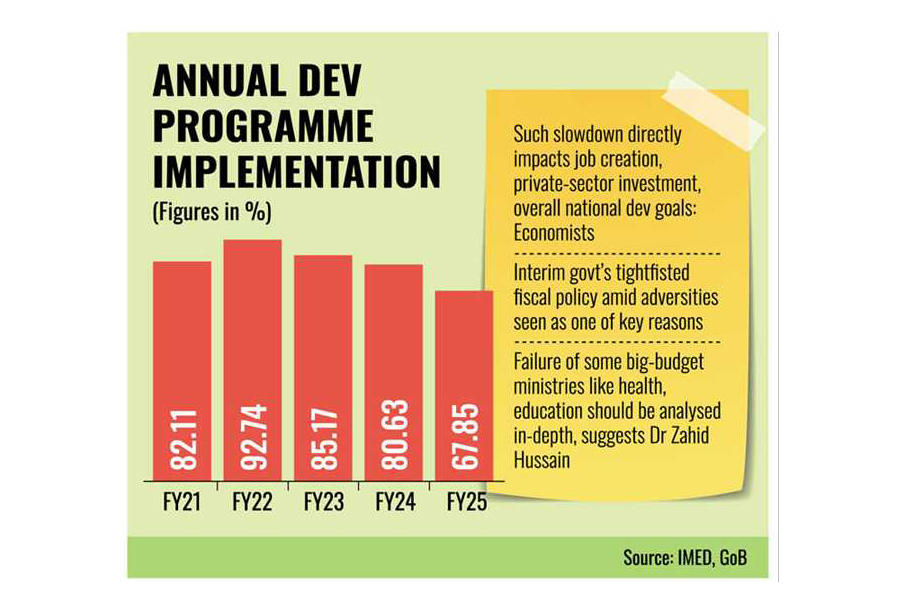Even cut-down Tk 2.26t ADP FY25 miserably misses target
Dev spending hits rock-bottom low at Tk 1.53t

Published :
Updated :

Development spending in Bangladesh hit rock bottom in the past fiscal year as agencies under the post-uprising government trailed far behind even the pared-down Tk 2.26-trillion Annual Development Programme.
Latest official statistics show the ADP-implementation rate in the fiscal year (FY) 2024-25 recorded a 20-year low, raising concerns about the country's economic development and job generation.
The government ministries and agencies spent only Tk 1.53 trillion or 67.85 per cent of the Tk 2.26-trillion revised ADP outlay, Implementation Monitoring and Evaluation Division (IMED) data showed.
The execution rate was 13-percentage-point lower than the 80.63 per cent in the previous FY2024, according to the official data.
Based on the available data, it was found that the rate of implementation rate of ADP in the last fiscal was the lowest in two decades since FY2005-06. The government had no open-source data before the FY2006.
Analysts attribute this unprecedented slowdown to a confluence of factors, including bureaucratic hurdles, a cautious approach to new project approvals amid global economic uncertainties, and a perceived lack of urgency in project execution by various ministries and implementing agencies.
Officials at the IMED told The Financial Express Wednesday that "the biggest failure" of the health ministry was the key reason for the lowest ADP-implementation rate, as this ministry could spend only 21.74 per cent of its total Tk 56.73 billion worth of outlay in the jus-past financial year.
Some other public agencies, including civil aviation and tourism ministry and the primary and mass education ministry, were on the lowest trajectory implementing lower than even the average 67.85-percent rate in the FY2025, officials said.
The analysts see the interim government's tightfisted fiscal policy as one of the key reasons for the lowest-ever ADP implementation in the last FY.
It was felt that the ADP implementation could even be much lower if the autonomous and semi-autonomous state-run companies had not performed well. The autonomous bodies used an impressive 93.21 per cent of their Tk 101.65-billion ADP outlay.
On the other hand, the government ministries and agencies were sluggish in implementing the project-aid portion in the ADP as they spent 65.53 per cent.
The ministries and agencies, however, spent higher funds from government's internal resources than the foreign-aided funds as it recorded 67.33 per cent in the last FY2025, the IMED data showed.
Among the top 15 ministries, the Health, Civil Aviation and Tourism, and Primary & Mass Education performed worse as their ADP-execution rate was lower than the average 67.85 per cent.
On the other hand, the power division and energy and mineral resources division showed best performance with their 98.10-percent and 90-percent implementation rate.
Economists and analysts point out several key issues contributing to this historic low. Delays in land acquisition, cumbersome procurement processes, and a shortage of skilled manpower for large-scale infrastructure projects have consistently held back progress.
"Furthermore, the government's focus on fiscal consolidation and managing inflation may have inadvertently led to a tighter grip on expenditure, impacting the pace of development activities," says one of them.
The implications of such a low implementation rate are far-reaching. Critical infrastructure projects, essential for boosting economic activity and improving public services, will face further delays.
This directly impacts job creation, private-sector investment, and the overall trajectory of national-development goals. The inability to fully utilise allocated funds also signifies a missed opportunity to stimulate the economy, especially at a time when global headwinds necessitate robust domestic demand.
Economists and development experts urge the government to undertake a comprehensive review of the ADP-implementation framework for future advances.
Senior economist Dr Zahid Hussain told the FE that this interim government faced several movements on the streets almost every week over the last one year which is one of the key reasons for the lower ADP implementation.
"Besides, the cautious public-spending approach and strict reviews of the ongoing projects by this government have also affected higher project-execution rate," he added.
Nevertheless, the failure of some big-budget-holding ministries, including health, education and others, should be analysed in-depth for streamlining their development-budget-spending capacity, the economist suggests.


 For all latest news, follow The Financial Express Google News channel.
For all latest news, follow The Financial Express Google News channel.